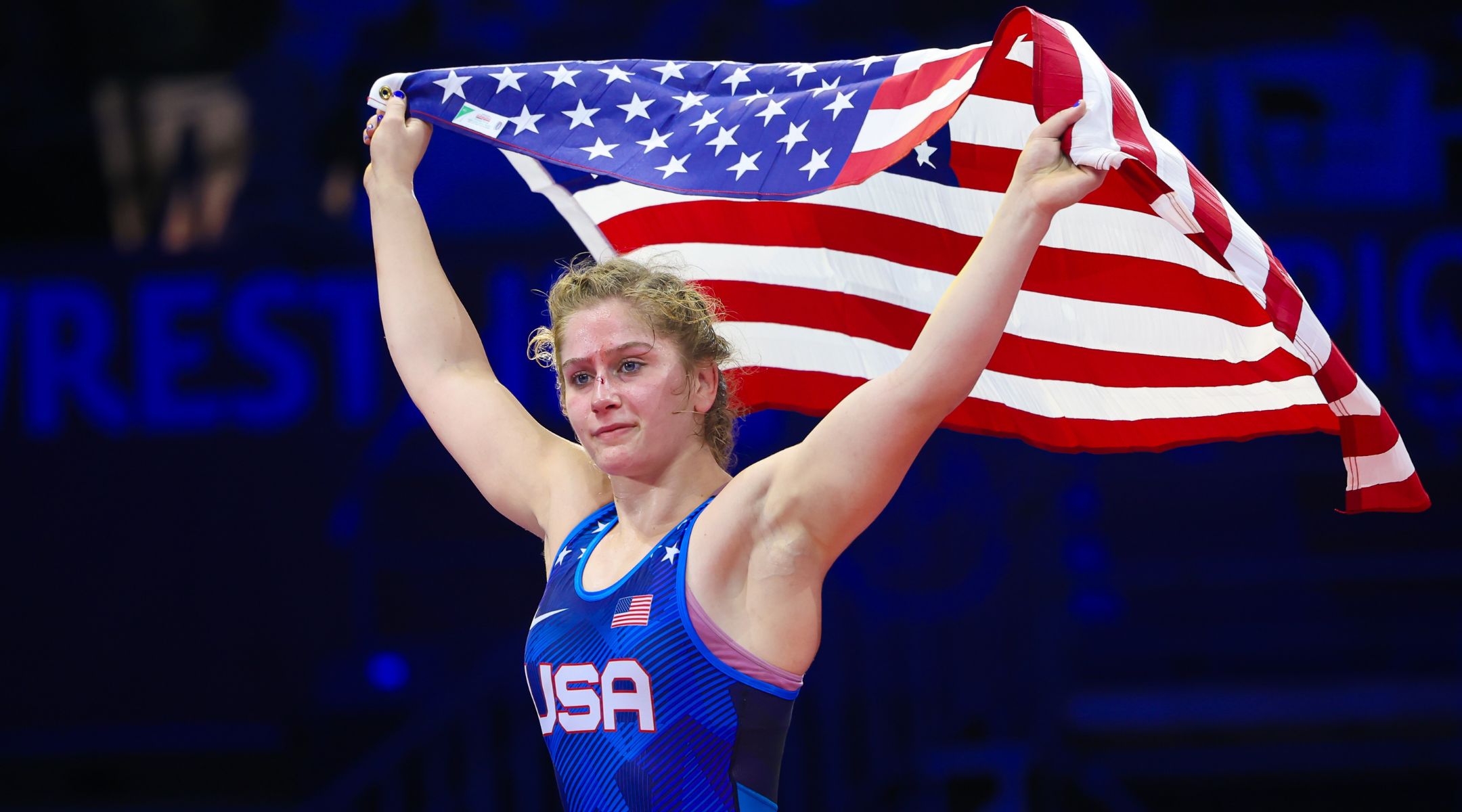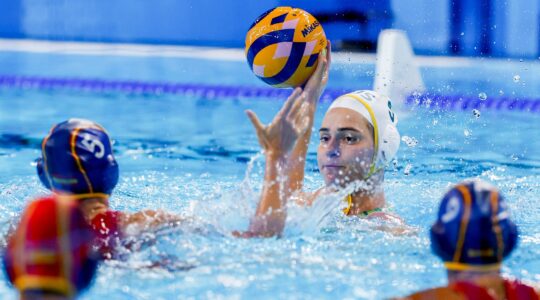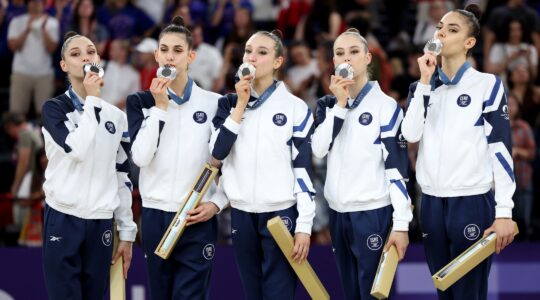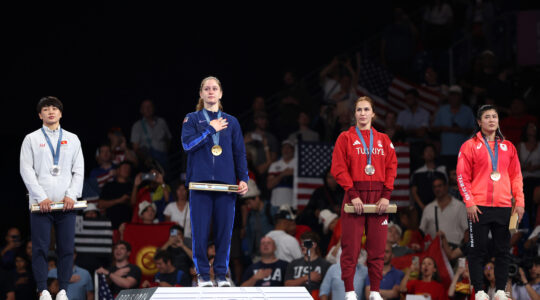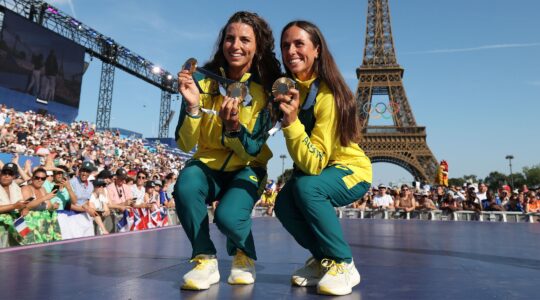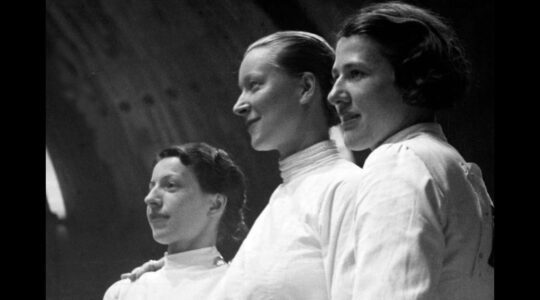Amit Elor hasn’t lost a wrestling match in five years. When the California native steps onto the Olympic mat on Monday as a gold-medal contender, she will carry the scars born of her personal life and of her Israeli heritage.
Elor is the youngest U.S. Olympic wrestler in history. She has already won eight world championships. She also leads a new generation of female wrestlers who have grown up with Olympic aspirations: Women’s wrestling was added to the Games in 2004, the year Elor was born.
Like many young athletes, Elor has chronicled her efforts on Instagram and TikTok, where she posts regularly about her training regimen, her injuries, her attempts to make weight and, of course, her many international victories.
She has been more subtle, however, about posting about her Jewish identity, especially after the Oct. 7 attack on Israel, her parents’ homeland and where her extended family still lives. Each of her grandfathers came to Israel after the Holocaust, one after surviving concentration camps as a young teen and the other after narrowly evading the Nazis by fleeing to Russia with his family as a child.
After carefully posting a few apolitical messages that were intended to convey hope and strength after the deadly attack, Elor received several “horrifying, scary messages,” she said, “even death threats, people telling me they were my fan but now they hope things happen to me. After that, it lit this fear in me, a bit. It’s very worrisome.”
She noted that wrestling is popular in Iran, a sworn enemy of Israel. Even people she thought were fans there turned negative.
“I even posted simple things, like ‘Happy Hanukkah’ or writing my name in Hebrew — not saying anything political at all — and I already get quite a few comments,” she said, like “‘Free Palestine,’ or ‘Oh, your people.’ I remember one comment, someone was writing, ‘You missed one.’ I think they think it’s funny.”
Elor said she was proceeding carefully as she decided what and where to post going into the Olympics.
“It’s important for me to be true to myself. I want to be real,” Elor said. “Everything in me wanted to speak up and express how I feel about the situation, but there are things I completely avoid — especially after 1972 in Munich, what happened to Israeli athletes. It’s just not smart for me at the moment.”
Eleven Israeli athletes and coaches were killed after being taken hostage by Palestinian terrorists at the Munich Games; officials in Paris reportedly chose not to disclose the location of a memorial service at this year’s Games, 52 years after the attack, out of security concerns.
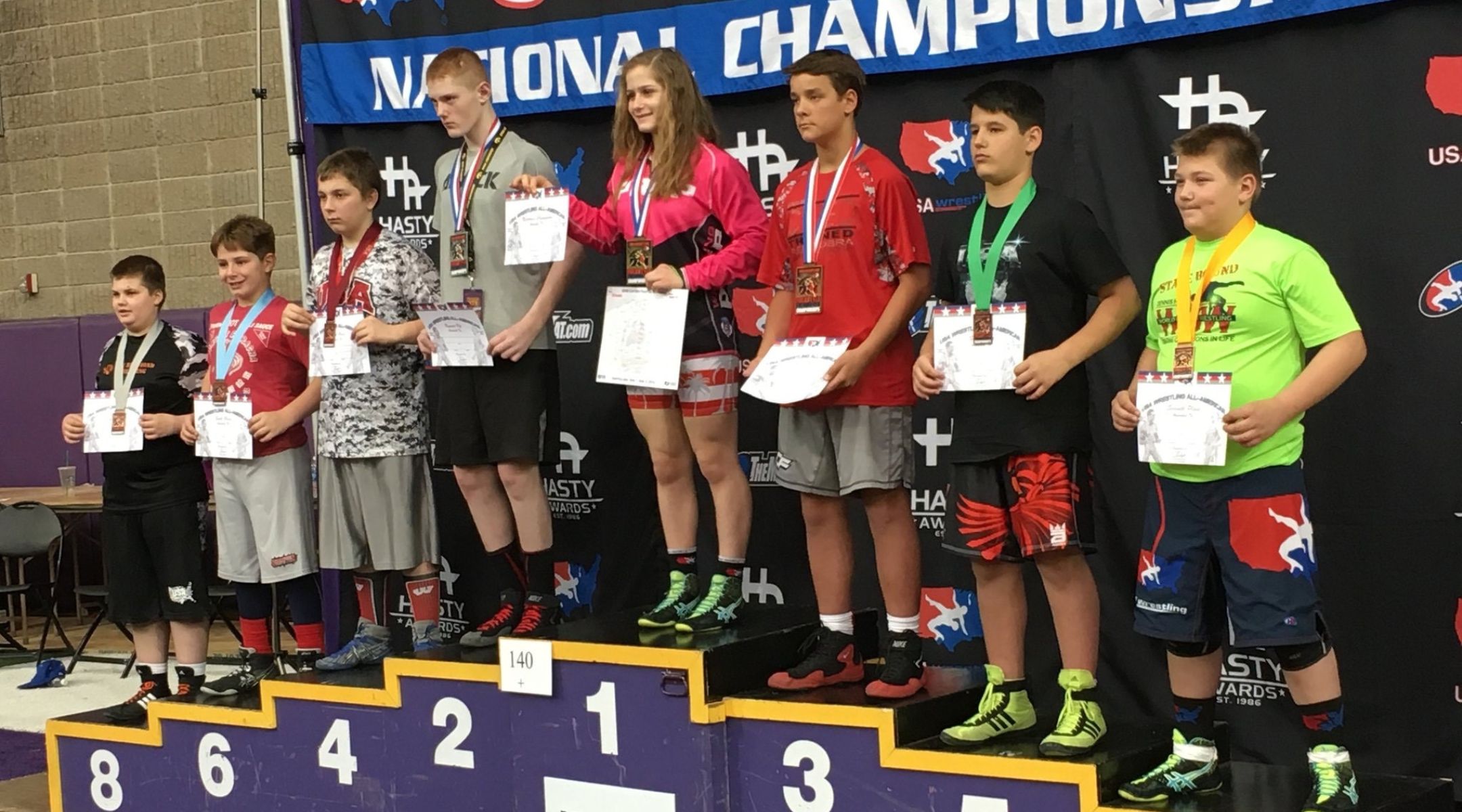
In 2016 at the age of 12, Amit Elor won a boys national folkstyle wrestling championship in Cedar Falls, Iowa. (Courtesy of the Elor family)
Elor’s self-discipline online matches the way she has approached her wrestling career. A 5-foot-7 powerhouse with blonde braids, Elor is the youngest of six children born over 20 years to Elana and Yair Elor. Her parents grew up in Ashkelon, Israel, and moved to the United States in 1980 when Yair received an athletic scholarship at Boise State University to throw shot put and discus. They eventually settled in Walnut Creek, California, about 45 minutes east of San Francisco, where they encouraged all their children to be active.
Amit recalled, “Every day, for weeks, I would go with my mom and I would watch my brother [Orry] and sister [Ronny] wrestle. It was just killing me. It looked like the funnest thing I’d ever seen. I couldn’t stand sitting on the side watching people.”
Finally, at her mother’s suggestion, Elor, shy at 4 years old, summoned the courage to approach the coach and convinced him to let her wrestle.
“It just felt like a calling to me,” Elor says now.
The appeal? “Being able to control somebody, take them down, handle them physically,” Elor said. “I wanted to learn how to do it. I have three older brothers. I’ve always seen them being physical. It looked like stuff I would do at home anyway.”
Sixteen years later, after devoting herself not only to wrestling but also to judo, jujitsu and taekwondo, Elor has found a unique style that her current coach said is impossible to replicate in practice, which, in turn, makes her extremely difficult to beat.
In general, Elor likes to initiate action and score quickly. Her coach, the 2004 Olympic silver medalist Sara McMann, said Elor has no weaknesses so they’ve primarily been working on trying to figure out how her opponents will respond to her strengths.
“By borrowing from different sports, she has more ways to score that don’t feel the same as a traditional freestyle wrestler,” McMann said. “She has some judo throws, she’s a purple belt in jujitsu, she blends Greco-[Roman] and freestyle wrestling. She makes it hard for people to anticipate where she’s going and what she wants to do.”
In 2016, at age 12, Elor watched her older brother Orry place fourth in the 98kg weight class (about 216 lbs.) in Greco-Roman at the U.S. Olympic Trials and saw the Rio Olympians get feted with balloons and confetti. It made an impression. (Orry is in Paris supporting her this month.)
At some point, coaches told Elor she had potential. “I don’t think I understood that it meant I was good at it,” she said, “but if somebody were to ask me when I was little, ‘Could you take down that little boy?’ I would confidently tell you: Yes. I did believe in myself and my strengths and my capabilities from a very young age.”
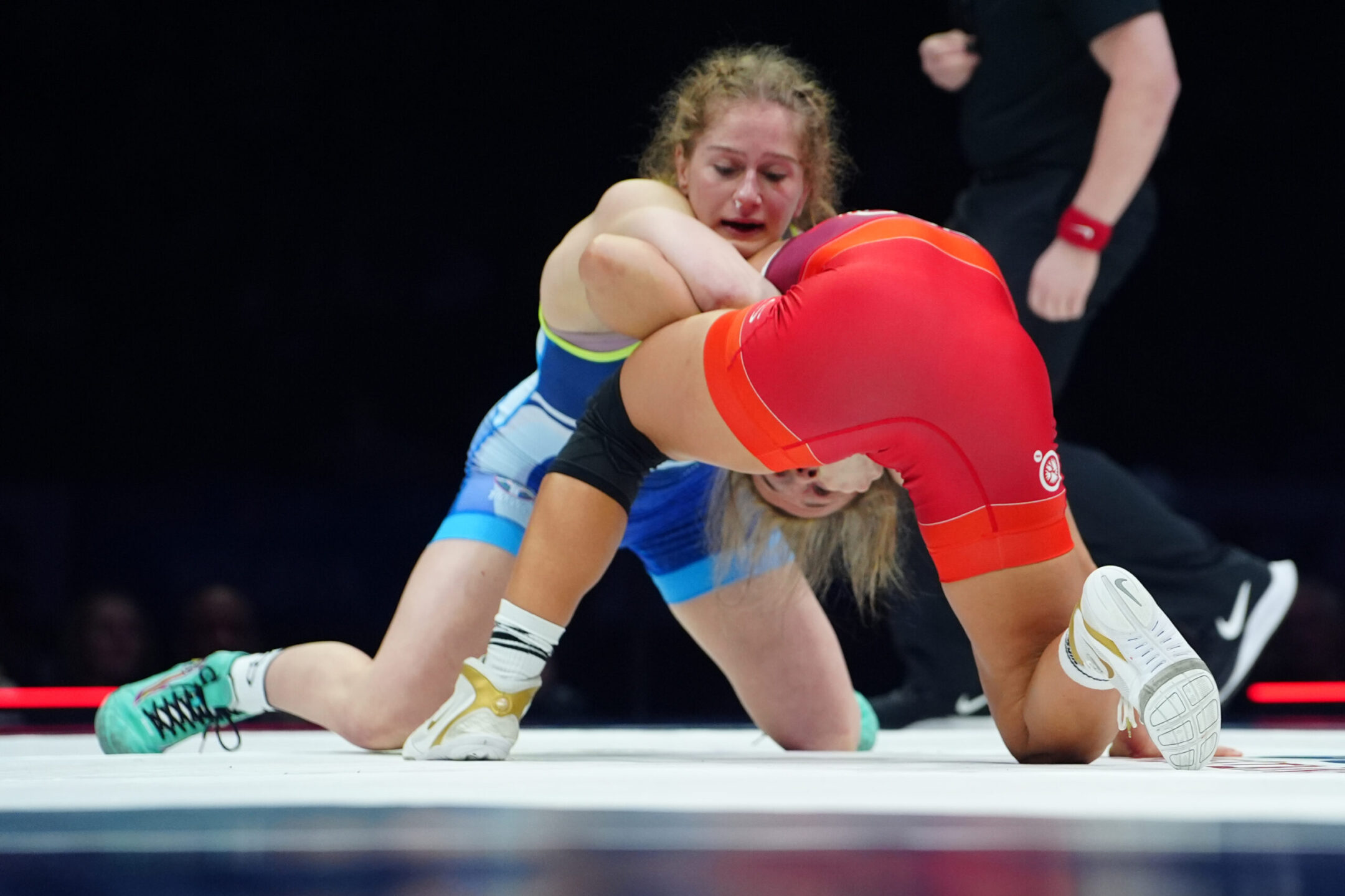
Amit Elor wrestles in the women’s freestyle 68kg championship finals of the Olympic wrestling team trials in University Park, Pennsylvania, April, 20, 2024. (Gregory Fisher/Icon Sportswire via Getty Images)
Around sixth grade, as more women entered the sport, Elor started wrestling girls. “Part of me thought it was strange because I got so used to the way boys move,” she said. “Boys are more sturdy and strong, but less flexible in the hips, shoulders, and back.”
When Elor was in her early teens, her mother would drive her all over the Bay Area to train and compete — sometimes motoring eight or nine hours to Las Vegas where Elor would wrestle in multiple weight and age groups to make the long road trip worth it. Once, she recalled contesting four divisions in a tournament, up to 12 matches a day. “More mat time, more experience,” Elor said. “I miss those days!”
She was also injury-free back then. “I assumed I was unbreakable,” she said.
Until April 7, 2018. Elor was 14, in eighth grade, competing in a two-day wrestling tournament with her mother in Reno. After she won, her mother revealed devastating news: Her older brother Oshry, then 23, had been fatally shot in his own home during a robbery attempt.
At 6-5 and 325 lbs., Oshry was a gifted football player and “a gentle soul in a giant body,” Elana Elor said. “He was very, very, very close to Amit.”
Amit sat through the entire trial, in which two men were ultimately convicted of crimes related to Oshry’s murder during the failed robbery attempt in his home.
“I did it for him, completely,” she said. “I wanted to support him. I needed to do that. It really hurt that I wasn’t there and didn’t see him in the days before, because of my wrestling, because of the trip.”
The verdict came two years later, via Zoom during the pandemic. The gunman received a life sentence without parole.
By then, Elor had already won her first world title, at 15, in the under-17 world championships. She didn’t compete in the Tokyo Olympic Trials because she was born one day after the age cut-off. Instead, she watched the Tokyo Olympics on her phone and laptop back in California, and saw Tamyra Mensah-Stock win the only gold medal for the US women’s wrestling team — in 68kg, the same weight Elor will represent in Paris.
“I have a lot of responsibility being in her weight,” Elor said, of her charismatic friend and mentor who turned pro last year.
More trauma came during Passover in 2022 when her father passed away suddenly, just days after the fourth anniversary of Oshry’s murder. Elor got the news when she was with her mother in Jersey City, training and preparing to qualify for her first senior world championships.
The cause of Yair’s death was never determined. He had been self-isolating with Covid on their property in California. When he didn’t show up for an appointment, someone checked on him — but it was too late. He was 64.
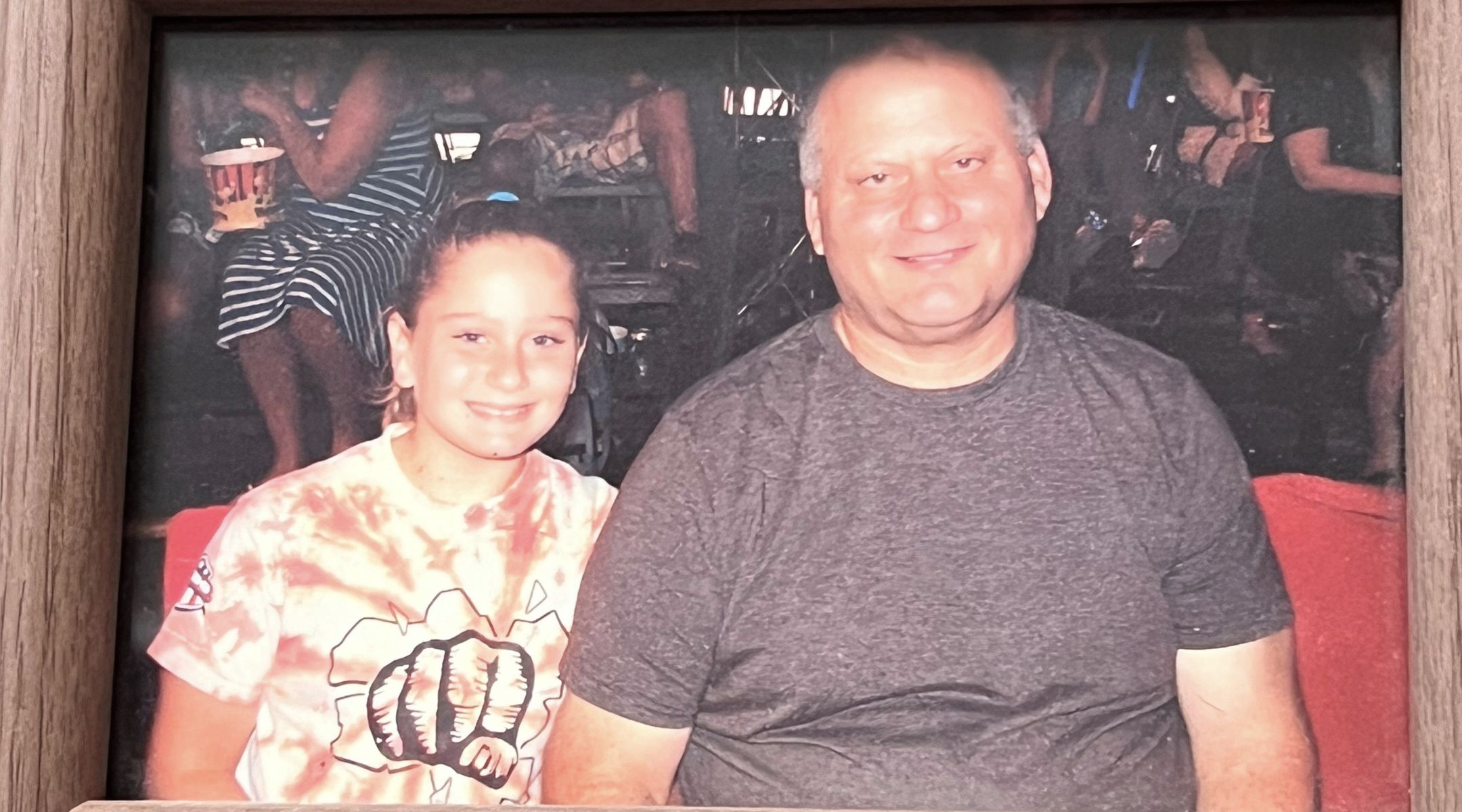
Amit Elor with her father, Yair Elor, at a show in Berkeley, California, in 2014 or 2015. (Courtesy of the Elor family)
Elor’s post after his death was the only time she wrote on Instagram exclusively in Hebrew, expressing her love for him and appreciation for all he had done for the family. This past April, she posted a picture from her visit to Yair and Oshry’s graves at Gan Shalom Cemetery in California.
“What’s really, really hard and still bothers me is that he was on his own, so there’s a lot of unknowns,” Elor said of her father’s death. “With my brother, I went to the trial and it was horrible, but I learned everything that happened and everything that led up to it. With my dad — I know he had health problems. He didn’t want help because he didn’t want to be exposed.”
Two months later, without many of her teammates knowing what she had been through, Elor won a crucial tournament at Madison Square Garden to qualify for her first senior world championships. Then, that October, 18-year-old Elor not only remained undefeated, she also made history as the youngest American wrestler — male or female — ever to win a senior world title.
“It killed me at the time that he didn’t see that,” she said, referring to her dad. “He would have been so proud.”
The same would have been true when she made the 2024 US Olympic team.
“I know it would make him so happy,” she said.
In Paris, her first Olympic matches are scheduled for Aug. 5 — her father’s birthday.
